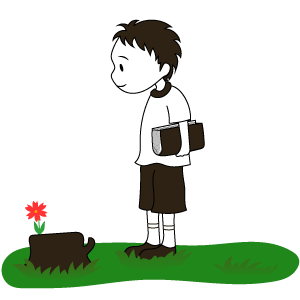Human emotions include joy, anger, sorrow, and pleasure.
If “sorrow” were to be replaced by “grief,” sadness would be an emotional expression such as crying or screaming.
In Italian, I have heard that the word “sadness” itself has a nuance of “malice”. In other words, “grief” can be taken as a bad thing in some cases.
Considering what this means, it may be that it is okay for people to feel “sad” about an event, but if they get too caught up in their sadness and start demanding sympathy from others, it may turn into “malice”. This sounds like something Latinos would think of, but I can understand what you mean.
There are as many sad events as there are stars. Life is indeed surrounded by sadness.
The most typical example of this may be when someone close to you dies. However, if an adult person cries for a long time, the adult will be sympathetic at first, but gradually become fed up with the situation. They will say, “How long are you going to cry for?
The same is true of a broken heart, which is an equally sad event. If you talk about your lost love all the time, even if you are close to the person you are talking to, you will get fed up. In other words, if “sympathy is forced on you,” your grief can become malicious.
That said, there is no way to prepare for grief, so you don’t know what will happen until you actually encounter it. In that sense, however, I believe that it is in the way one grieves that one’s personality comes out.
Not long ago, the daughter of a TV personality was killed in a traffic accident. The incident itself was very tragic, and for a while, the TV personality was featured on a number of information programs and even appeared in a car insurance commercial, all for the purpose of preventing traffic accidents.
In the beginning, viewers watched the commercial, remembering the tragic incident and sharing their sympathy and sadness for the father of the child. The insurance product also sold quite well.
However, the program was suddenly discontinued. The reason for this was that many viewers eventually began to feel pain with watching that commercial and changed the channel.
This is one example of how an outpouring of “grief” came to be perceived as “malicious” by people.
Of course, sadness is one of those emotions that we would prefer not to encounter.
At the same time, it is an emotion that we do not want to share with others. As in this commercial, people accept it with sympathy for a time, but it is an emotion that arises out of a kindness to ease the sadness of the person in question. However, there is a limit to how much the receiver will be willing to accept.
After all, no matter how sad we are, we must ultimately deal with our grief alone.
When you have a broken heart,” “when you fail an exam,” “when someone dies.”
Even if we cry, scream, and tear our hair out, we will still have to face and come to terms with our sadness at some point.
If this is the case, why do people want to watch sad movies and literature? It is because they want to project themselves onto the characters and experience “sadness” in a virtual experience. Sadness is a necessary part of life for human beings, as long as we are human beings, because we are capable of experiencing joy, anger, sorrow, and happiness.
Sadness.
Sadness is a feeling that belongs only to the person who feels it. If that is the case, how can we learn to control that uncontrollable sadness?
I think the only way is to experience a lot of sadness. And, I believe that sadness, as sadness, is something you have to get used to.
Get used to sadness. Get used to it little by little. This may be the way to become stronger as a human being. On the other hand, I think there is another way of thinking that one does not have to get used to it and that one can cry as much as one wants to.
However, even so, it is still alone to cry. Everyone has cried alone, but it should not be for that long. Children cry forever because they cannot come to terms “with” their grief.
The title of Françoise Sagan’s debut book, “Hello, Sadness,” was taken from a poem by Paul Éluard, and there is a phrase in the work that says, “There is a place where people seek sorrow themselves or create it if there is none.
This seems to apply not only to “grief,” but to all joy, anger, sorrow, and pleasure.
There is joy because there is sorrow. Because there is joy, there is sadness. In order not to turn sadness into easy malice, we may have to finally come to terms with it with the attitude, “Hello, sadness.
See you soon.












